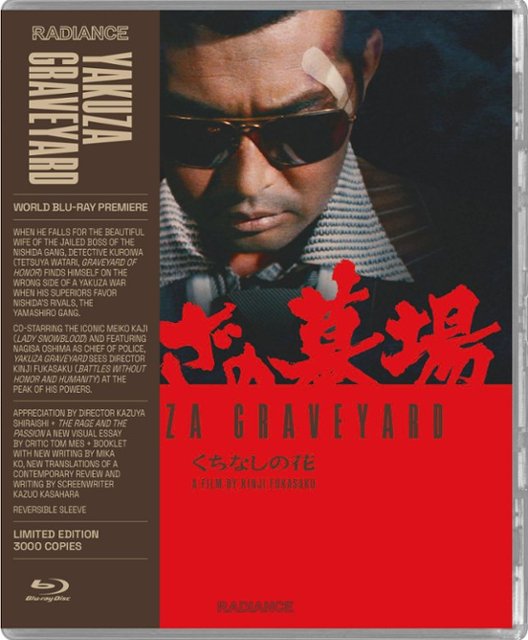Springing forth this summer from Radiance is the underseen gangster flick Yakuza Graveyard from acclaimed Japanese director Kinji Fukasaku beautifully restored on blu-ray for the first time.
Tetsuya Watari plays a rage-filled cop named Kuroiwa who isn’t afraid to get his hands dirty in pursuit of his goals. Kuroiwa, sickened by his department’s unofficial and corrupt alliance with a prominent yakuza gang, starts befriending a member of their main rival as a kind of spiteful act. While working with this gang, Kuroiwa falls for his friend’s sister Keiko (played by the great Meiko Kaji of Lady Snowblood and Female Prisoner #701 fame) which leads to tragic consequences.
It’s astonishing that Kinji Fukasaku in the west remains something of a cult director, still primarily known for directing Battle Royale (2000) at the tail end of his decades long career. Cool people will know though that Fukasaku has a wide and diverse range of films dating all the way back to the early ’60s, from sci-fi like The Green Slime and Message from Space to offbeat oddities like Samurai Resurrection and Black Rose. But Fukasaku is perhaps most well-known among genre enthusiasts for his kinetic, rough-and-tumble, gritty crime films and especially his epic Battles Without Honor and Humanity series. Battles is a complex, sprawling group of films featuring dozens of characters with interwoven destinies told in a highly procedural style, full of betrayal and murder. On the other end of the spectrum of Fukasaku’s crime films are his smaller in scope but no less action-packed and raucous flicks imbued with a more personal emotional touch. Films in this mold include Graveyard of Honor, Street Mobster and the film I’m here to talk about, Yakuza Graveyard.
Kuroiwa is a cop in the mold of the likes of “Popeye” Doyle and “Dirty” Harry Callahan but even more angry and extreme in his actions. Kuroiwa is very much a noir kind of protagonist. One can see his doomed fate from the beginning despite (or perhaps because of) his attraction to Keiko. This central relationship seems so prominent at times that the film almost feels like one of those “restless youth” Sun Tribe pictures that were all the rage in Japan in the ’60s (Crazed Fruit, Season of the Sun). The film also includes a fairly unique aspect not often seen portrayed in Japanese movies of this era with two of the major characters being Korean. As described in the excellent essay by Mika Ko in the booklet included with this release, zainichi Koreans, Koreans who were societally displaced in and forced to conform to Japanese society during WWII, were rarely given a nod in film, despite being a non-trivial part of the lower reaches of Japanese society in the time period many of these films took place. Yakuza Graveyard puts this controversial topic front and center and makes it a heated topic of conversation between the characters and a major motivator of Keiko’s actions and feelings. While I’ve touched on what sets this film apart from other Fukasaku gangster films, it’s important to note how it still fits comfortably within Fukasaku’s oeuvre. First of all, the cinematography and camera are classic Fukasaku touches with lots of grit and realism with extensive use of handheld cameras to really hit home that in-your-face immediacy that Fukasaku brings to the table. Fukasaku also works once again with writer Kazuo Kasahara who he had collaborated with several times previously on the Battles Without Honor and Humanity films and Cops vs. Thugs. Kasahara’s writing goes a long way toward bringing an authenticity to the world of yakuza that helps elevate the films above other similar crime flicks of the era.
Overall this is very nice-looking transfer (although oddly Radiance doesn’t provide much info on where it was sourced from). Some of the dark scenes do look a little messy but in general the film has a healthy amount of grain and shows off Fuksasaku’s at times very shaky, action oriented camerawork really well. The audio is provided in a Japanese mono track that sounds nice and clean although not terribly showy. The extras provided are a very nice collection of interviews and essays that give a nice amount of context into the making of the film and its place in Fukasaku’s career. We have a very nice visual essay from Tom Mes on Meiko Kaiji (who literally wrote the book on her) as well as an interview with director Kazuya Shiraishi praising Fukasaku and providing info on why he’s a great director. Like other Radiance releases, we also get a nice booklet with several essays including the aforementioned essay from Mika Ko on Koreans in Japan, an essay by writer Kazuo Kasahara and an extended archival review of the film by Masao Matsuda from 1976. Overall, it’s a nice package and honestly I don’t miss the lack of an audio commentary which seems to often be included on these kinds of releases.
On the whole, I think Yakuza Graveyard is a great Fukasaku crime film that both fits comfortably within his filmography while offering unique touches that set it apart from other yakuza films. This disc is highly recommended for Fukasaku fans or folks looking for a gangster fix that gives a level of depth of character not often seen in these kinds of films.

